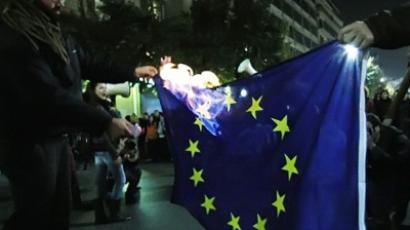‘When in Rome, do as Brussels bids…’
In Greece and Italy, new and unelected leaders are grappling with the same old problems. While the EU presses Athens to give written guarantees on its budget cuts, Italy’s new leader is mapping out a strategy to deal with the country’s debt crisis.
People have again taken to the streets outside the parliament building in Athens to protest against yet another round of belt-tightening measures as a condition for the next tranche of international loans to the country. Meanwhile in Italy, there are widespread fears that the new administration is preparing to do Brussels’ bidding.Meeting EU officials in Brussels, Greece’s new Prime Minister Lucas Papademos has backed a demand for more austerity “in order to eliminate uncertainties and ambiguities concerning actions to be taken in the future by parties that may be in power,” he said, as cited by Bloomberg.As the euro crisis continues to claim political heads, RT’s Sara Firth has travelled to Europe to see for herself the changing face of European democracy. “This government has been formed with the explicit aim, specific task, to do what Europe requires,” political journalist Fabrizio Maronta told RT, commenting on the recent changes in Italy. The new leaders have been holding close talks with their European counterparts. Papademos called the task before him Herculean; others might call it impossible. In trying to balance democracy with debt reduction, it seems that for now, the latter has won out.“The problem is there is no political party or academics that have concrete suggestions, alternative suggestions, to the crisis,” Aris Hatzistefanou, director of the documentary film “Debtocracy,” told RT. In Italy, Sara spoke with economist Marcello de Cecco about why, when it comes to finding a solution, the people seem to be being left out of the equation.RT:“What we’ve seen happening throughout this eurocrisis has seemed to a lot of people very, very confusing. Do you think this sense of economic and political games has gone too far, and it is perhaps now time to give the decisions back to the people who this is affecting?”“I think it should have gone through this referendum – are you prepared to make sacrifices to stay in the eurozone or not? And I think it was a good idea. They would have all said ‘yes,’” he believes. But Papandreou’s proposal to call a referendum was followed by his swift exit from the political scene. But eventually, people are going to have to be asked what they want. Despite strong eurozone rhetoric that there is no alternative to being inside the single currency, it has become increasingly clear that there is and always has been a choice. It is about time that people are allowed to make one.“People are afraid and are blackmailed every day,” Aris Hatzistefanou told RT. “They saying to them, ‘Look, if you don’t accept what the Europeans are saying, if you don’t accept the austerity measures imposed by the government and by IMF, it will be hell.’”Whilst leaving the eurozone still remains an extremely unpopular prospect, so too is simply continuing along Brussels’ prescribed path, which has so far meant more austerity, more painful job cuts, more bailouts, but no solution.All of which has led to growing social unrest which threatens to undermine the whole concept of European unity.
George Katroungalos, a lawyer and professor of constitutional law, believes the rescue cash the new prime minister is striving for will not be enough to allow the unelected technocrats to lead their countries.“Very probably we are going to take this cash,” he told RT, commenting on the next tranche of international aid for Greece. “But of course, it is not going to save us. As long as these austerity measures are going to be implemented, there is no way out for Greece, nor for the other countries of the eurozone,” he said. “This is not just a Greek problem,” he went on. “It is a structural problem of the eurozone. That is why the countries that are hit are core countries, like Italy. Even France now is in the center of turmoil. The problem is that these neo-liberal policies are not efficient. They are not only socially unjust, they cannot offer any way out from the crisis. Therefore the only solution is a completely different mix of policies".“Greece is not only under the control of Brussels, but there is a complete lack of democratic legitimacy. Not only do we have a prime minister who has never been elected, but they try to impose policies on us which are completely out of touch with a majority of the population and are against national sovereignty,” he concluded.














